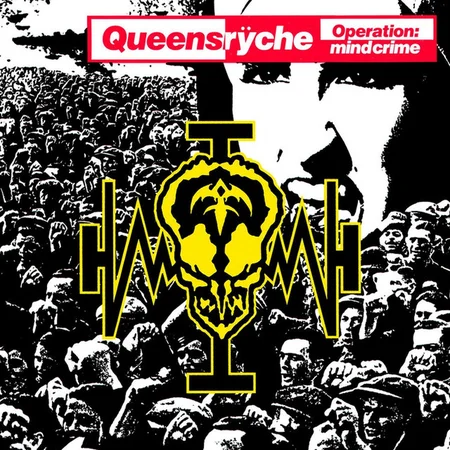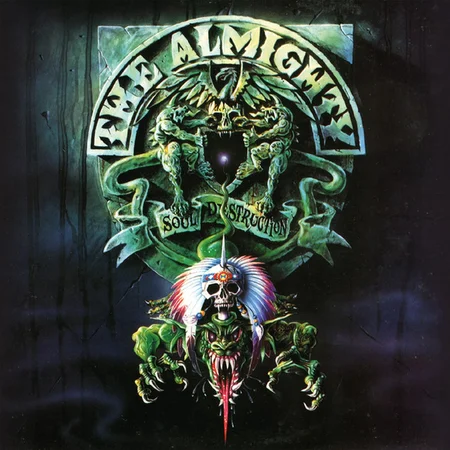
Introduction
In 1988, the heavy metal scene was forever changed with the release of “Operation: Mindcrime” by Queensrÿche. This album is not just a collection of songs but a concept album that delves into themes of political corruption, addiction, and revolution. As a rock opera, it narrates the story of Nikki, a drug addict caught in a web of political manipulation. The album’s significance is underscored by its critical acclaim and its enduring influence in the music industry.
This article will explore the genesis of “Operation: Mindcrime”, the recording process, its commercial performance, and its lasting legacy. We will also provide an in-depth track analysis and discuss the album’s themes and lyrics.
| Attribute | Details |
|---|---|
| Release Date | May 3, 1988 |
| Album Title | Operation: Mindcrime |
| Genre | Heavy Metal, Progressive Metal |
| Total Runtime | 59:14 |
| Number of Tracks | 15 |
| Record Label | EMI, Manhattan |
| Recording Studio | Kajem/Victory Studios, Gladwyne, Pennsylvania; Le Studio, Morin Heights, Quebec |
| Producer(s) | Peter Collins |
Geoff Tate, the band’s lead vocalist, once remarked, “This album was a chance to tell a story that was both personal and universal.” Such ambition and storytelling have made “Operation: Mindcrime” a landmark in rock history.
The Genesis of “Operation: Mindcrime”
The story of “Operation: Mindcrime” begins in the mid-1980s when Queensrÿche was navigating the evolving music scene. The band had already made a mark with their previous albums, but they were eager to push boundaries. The mid-1980s were a time of experimentation in heavy metal, with bands exploring complex themes and narratives.
Before “Operation: Mindcrime”, Queensrÿche released “Rage for Order”, an album that hinted at their potential for storytelling and thematic depth. The success of “Rage for Order” gave the band the confidence to pursue a more ambitious project. Geoff Tate and Chris DeGarmo were the primary creative forces behind “Operation: Mindcrime”, crafting a narrative that was both intricate and compelling.
The album’s concept was inspired by Tate’s experiences in Montreal, where he encountered members of the Quebec separatist movement. These interactions, combined with his observations of societal issues, fueled the album’s storyline. The title “Operation: Mindcrime” reflects the central theme of manipulation and control.
Below is a table of the band members and their roles:
| Band Member | Instrument/Role |
|---|---|
| Geoff Tate | Lead Vocals, Keyboard |
| Michael Wilton | Guitars |
| Chris DeGarmo | Guitars, Guitar Synthesizer, Backing Vocals |
| Eddie Jackson | Bass, Backing Vocals |
| Scott Rockenfield | Drums, Percussion |
The album was financed by EMI, which believed in the band’s vision. The recording costs were substantial, but the label’s support allowed Queensrÿche to bring their ambitious project to life. The album artwork, designed by Hugh Syme, visually captured the themes of revolution and control, setting the tone for the album’s narrative.
Recording Process
The recording of “Operation: Mindcrime” was as ambitious as its concept. The sessions took place at Kajem/Victory Studios in Pennsylvania and Le Studio in Quebec, two renowned facilities known for their state-of-the-art equipment and acoustics.
The recording process spanned from 1987 to 1988, with Peter Collins at the helm as producer. Collins was known for his meticulous approach and had previously worked with artists like Rush and Alice Cooper. His experience in handling complex projects made him the ideal choice for this album.
Below is a table of likely hardware used in the studios:
| Equipment | Details |
|---|---|
| Microphones | Neumann U87, Shure SM57 |
| Mixing Desk | SSL 4000 B |
| Compressors | Urei 1176, LA-2A |
| Guitars | Gibson Les Paul, Fender Stratocaster |
| Amplifiers | Marshall JCM800 |
The sessions were not without challenges. The band faced technical issues and the pressure of delivering a groundbreaking album. However, these obstacles only fueled their determination.
Peter Collins has an impressive discography, having produced numerous albums across various genres. Below is a table of albums produced by him:
| Producer | Artist | Album | Year |
|---|---|---|---|
| Peter Collins | Rush | Power Windows | 1985 |
| Peter Collins | Rush | Hold Your Fire | 1987 |
| Peter Collins | Alice Cooper | Hey Stoopid | 1991 |
Commercial Performance and Reception
Upon its release, “Operation: Mindcrime” quickly established itself as a critical and commercial success. It peaked at number 50 on the Billboard 200, marking Queensrÿche’s breakthrough into mainstream consciousness. The album’s singles, “Eyes of a Stranger” and “I Don’t Believe in Love”, charted successfully and helped cement the band’s status in the rock world.
The album was certified gold by the RIAA in 1989 and achieved platinum status two years later. Its success was not limited to the United States; it resonated with audiences worldwide, solidifying Queensrÿche’s international reputation.
Below is a table of Queensrÿche’s studio albums:
| Album Title | Year | Sales Data |
|---|---|---|
| Queensrÿche | 1982 | 500,000 |
| The Warning | 1984 | 500,000 |
| Rage for Order | 1986 | 500,000 |
| Operation: Mindcrime | 1988 | 1,000,000 |
| Empire | 1990 | 3,160,000 |
The album received numerous accolades, including a Grammy nomination for “I Don’t Believe in Love” in 1990. It was also ranked among the “100 Greatest Heavy Metal Albums of All Time” by Kerrang! and Decibel.
In 1988, several other significant albums were released by similar artists, including:
- …And Justice for All by Metallica
- Seventh Son of a Seventh Son by Iron Maiden
- State of Euphoria by Anthrax
The album’s impact extended beyond sales and awards. It influenced a generation of musicians and remains a touchstone in the progressive metal genre. In 1988, the heavy music scene was vibrant, with bands like Metallica and Iron Maiden releasing landmark albums. “Operation: Mindcrime” stood out for its narrative depth and musical complexity, contributing to the genre’s evolution.
Track Analysis
“Operation: Mindcrime” is a concept album that weaves a narrative through its tracks. The singles released from the album include “Eyes of a Stranger”, “I Don’t Believe in Love”, and “Revolution Calling”. These songs were pivotal in driving the album’s commercial success and critical acclaim.
Below is a table of the album’s tracks and their details:
| Song | Connection to the Story |
|---|---|
| I Remember Now | The story begins with Nikki waking up in a hospital, disoriented and haunted by memories of his past. |
| Anarchy-X | An instrumental prelude that sets the tone of chaos and political unrest in the dystopian world. |
| Revolution Calling* | Nikki is drawn to Dr. X’s revolutionary ideology, fueled by disillusionment with societal corruption. |
| Operation: Mindcrime* | Nikki is brainwashed and turned into an assassin under Dr. X’s control. |
| Speak | Nikki fervently spreads the revolution’s ideals, losing himself in the process. |
| Spreading the Disease | The story delves into societal decay and the tragic backstory of Sister Mary. |
| The Mission | Nikki begins to question his purpose and the morality of his actions as an assassin. |
| Suite Sister Mary | Dr. X orders Nikki to kill Sister Mary, leading to a pivotal moment of inner conflict. |
| The Needle Lies | Nikki rejects his addiction and resolves to escape Dr. X’s control. |
| Electric Requiem | Nikki discovers Sister Mary’s lifeless body, shattering his emotional state. |
| Breaking the Silence | Nikki struggles with guilt and grief over Mary’s death, reflecting on his role in the revolution. |
| I Don’t Believe in Love* | Nikki rejects love and emotional connection, consumed by bitterness and despair. |
| Waiting for 22 | An instrumental interlude reflecting Nikki’s emotional paralysis and bleak outlook. |
| My Empty Room | Nikki reflects on his shattered life, alone and desperate for meaning. |
| Eyes of a Stranger* | The story ends with Nikki in a psychiatric hospital, questioning his identity and choices. |
Note: Tracks marked with * were released as singles. “Revolution Calling” and “I Don’t Believe in Love” charted successfully.
Song Meaning and Lyrics
The lyrics of “Operation: Mindcrime” are a profound exploration of political and social themes. The singles “Revolution Calling”, “Eyes of a Stranger”, and “I Don’t Believe in Love” stand out for their lyrical depth and storytelling.
“Revolution Calling” is a critique of political corruption and media manipulation. It captures the protagonist Nikki’s disillusionment with society and his call for change. The lyrics, “Gotta make a million doesn’t matter who dies,” highlight the moral decay and materialism prevalent in society. For more insights, visit SongMeanings.
“Eyes of a Stranger” deals with themes of identity and self-reflection. Nikki’s struggle with his past and his search for redemption are central to the song’s narrative. The line “I’ve always known that the mirror never lies” underscores the theme of confronting one’s true self. More details can be found at SongMeanings.
“I Don’t Believe in Love” explores the pain of betrayal and disillusionment with love. The protagonist’s emotional turmoil is captured in lines like “I never wanted to feel this way, but I don’t believe in love.” This song resonates with listeners who have experienced heartbreak. Visit SongMeanings for more interpretations.
Touring and Promotion of Operation: Mindcrime
The promotion of “Operation: Mindcrime” was as ambitious as the album itself. Queensrÿche employed various strategies to market the album, including music videos for singles like “Eyes of a Stranger”. These videos helped visually convey the album’s themes and expand its reach.
The band embarked on a tour to support the album, performing over 100 shows across North America and Europe. Notable performances included appearances at major festivals and headline shows in iconic venues. The tour was crucial in building the album’s reputation and expanding Queensrÿche’s fanbase.
During 1988, Queensrÿche toured with bands like Metallica and Def Leppard, sharing stages with some of the biggest names in rock. These collaborations not only increased their exposure but also solidified their status in the rock community.
Influences and Legacy
“Operation: Mindcrime” was influenced by various musical and cultural elements. The band drew inspiration from progressive rock and heavy metal, as well as the socio-political climate of the 1980s.
Below is a table of influences:
| Influences on “Operation: Mindcrime” | Artists Influenced by “Operation: Mindcrime” |
|---|---|
| Pink Floyd | Dream Theater |
| Rush | Fates Warning |
| Iron Maiden | Avenged Sevenfold |
Released in 1988, “Operation: Mindcrime” left an indelible mark on the music landscape. That year, significant global events included the introduction of the Internet Relay Chat and the beginning of the Soviet Union’s transition towards a mixed economy. Culturally, films like “Rain Man” and “Who Framed Roger Rabbit” dominated the box office.
Five Things about Operation: Mindcrime
“Operation: Mindcrime” is a treasure trove of interesting facts. Here are five notable ones:
| Fact | Details |
|---|---|
| Concept Album | It tells a story of political corruption and revolution. |
| Critical Acclaim | Ranked among the “100 Greatest Heavy Metal Albums” by Kerrang! |
| Inspiration | Inspired by Geoff Tate’s experiences in Montreal. |
| Artwork | Designed by Hugh Syme, capturing the album’s themes. |
| Live Performances | Performed in its entirety during the Empire tour. |
Media and Television Usage
Despite its cultural impact, songs from “Operation: Mindcrime” have not been widely used in media and television. Our research did not uncover any notable appearances in films or TV shows.
Critical Reviews and Retrospectives
“Operation: Mindcrime” received widespread acclaim upon its release. Critics praised its ambitious narrative and musical complexity. Rock Hard noted the album’s “clever breaks and unusual song structures”.
Below is a table of reviews:
| Publication | Review Score | Notable Quotes | Link |
|---|---|---|---|
| Kerrang! | 4/5 | “A conceptual brilliance.” | Kerrang! |
| AllMusic | 4.5/5 | “A testament to Queensrÿche’s creativity.” | AllMusic |
After Operation: Mindcrime
Following “Operation: Mindcrime”, Queensrÿche continued to evolve. Their next album, “Empire”, was a commercial triumph, selling over 3 million copies. However, the band faced challenges, including lineup changes and shifting musical trends.
Despite these challenges, Queensrÿche remained a force in the rock world. They released several albums in the following decades, each exploring new musical territories. As of 2024, the band continues to tour and record, maintaining a loyal fanbase.
Conclusion
“Operation: Mindcrime” remains a landmark in rock history. Its themes of political corruption and personal struggle resonate with listeners even today. The album’s impact on music and culture is undeniable, influencing countless artists and inspiring a new generation of musicians.
For further exploration, check out our articles on Empire by Queensrÿche and Promised Land by Queensrÿche. For more information, visit the Wikipedia page for “Operation: Mindcrime”, the official Queensrÿche website, and the record label’s website.
Let us know in the comments what your thoughts are on Operation: Mindcrime by Queensrÿche. Did we miss anything? Share your experiences and join the conversation!





